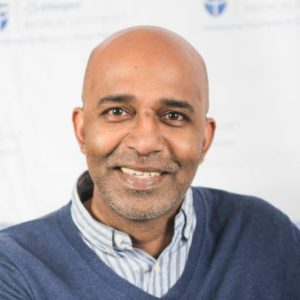Meet Anton Emmanuel
Anton Emmanuel obtained his medical degree from London University. He is a Professor in Neuro-Gastroenterology at University College London and Consultant Gastroenterologist at University College Hospital and the National Hospital for Neurology and Neurosurgery (Queen Square). Prior to this, he was Senior Lecturer at Imperial College and Honorary Consultant Gastroenterologist at St Mark's Hospital. Anton is also BSG Treasurer, and sits on the Board of Trustees, Council, and the Executive Committee.
What attracted you to a career in Gastroenterology?
I started off in a career in neurology, not gastro! I went to St Marks to do my PhD in nerve control of gut function in Parkinson’s Disease. There I fell under the spell of 2 clinicians who totally changed the way I felt about clinical practice. One of them was John Lennard-Jones, a brilliant, thoughtful, kind man who was extraordinarily good at what he did – and was a previous President of BSG. And the other was Michael Kamm, who is still in practice in Australia now. It was quite easy to change speciality then so I was incredibly lucky to be working under two highly respected characters who were both so gifted and clinically observant who really shared the passion of what is fun about gastroenterology.
What advancement in gastroenterology are you most excited about at the moment?
Well, everyone is interested in microbiota, but parking that subject, for now, I am really interested in patient phenotypes as an alternative to testing. So rather than seeing a patient with abdominal pain and ordering an endoscopy, we look at them instead as a person with abdominal pain of this sort, which began in this way and which needs this kind of approach. I’d like to see a move from ‘Symptoms, Signs, Investigations, Diagnosis’ to a more holistic approach. The history and the investigations are all part of the craft, but the exciting part is tying them into phenotypes.
What do you enjoy most about your work?
I am very fortunate that I am constantly exposed to the two elements I love the most; the first is the patients who go from being complete strangers to people I can talk to about the most intimate details of their bowels, their appetite and the way they live their life. The fact that they share that with me is an extraordinary thing that I never take for granted. The second element is the young, bright and enthusiastic doctors and nurses I work with, who want to do PhDs in research with us, and I genuinely learn a lot from having all my preconceptions constantly disrupted.
What’s the one thing you could change if you could?
I’d like not to feel quite as tired at the end of the day! More seriously, I’d love it if people’s aspirations didn’t end up taking them away from clinical care. Promotion in medicine and nursing has become about being managerial. We need clinician managers but there should be a way of keeping clinicians doing what they are good at so there’s a parallel stream of people who are fantastically good at administering or governance or processes, alongside a stream of brilliant clinicians still involved with patients. It’s like football managers, some are good at playing and some are good at managing but few are good at both.
What’s the best advice you’ve been given during your career?
I’ve been the recipient of so much good mentorship and kindness, so there is no single thing except always find the thing that you are passionate about. It’s not just about finding a niche, which implies you have to compete with someone else to fill that niche. I’d also say, find somebody or a group of people that you trust and who will ask you questions to test your decisions. It’s impossible to develop your thinking and your career on your own so the best thing is to have a group of critical friends who are able to disagree with you and debate things.
What does being a BSG member mean to you?
I come from a modest background and I am a strong believer in unions and teams so the biggest things I get out of BSG membership is the sense of kinship. Having a collection of like-minded colleagues under one umbrella essentially feels like a union who are defending the best interests of patients but also the BSG members. That’s what I treasure about being involved in the BSG.
If you are interested in taking part in our Meet our Members initiative, please contact the BSG Communications team.
